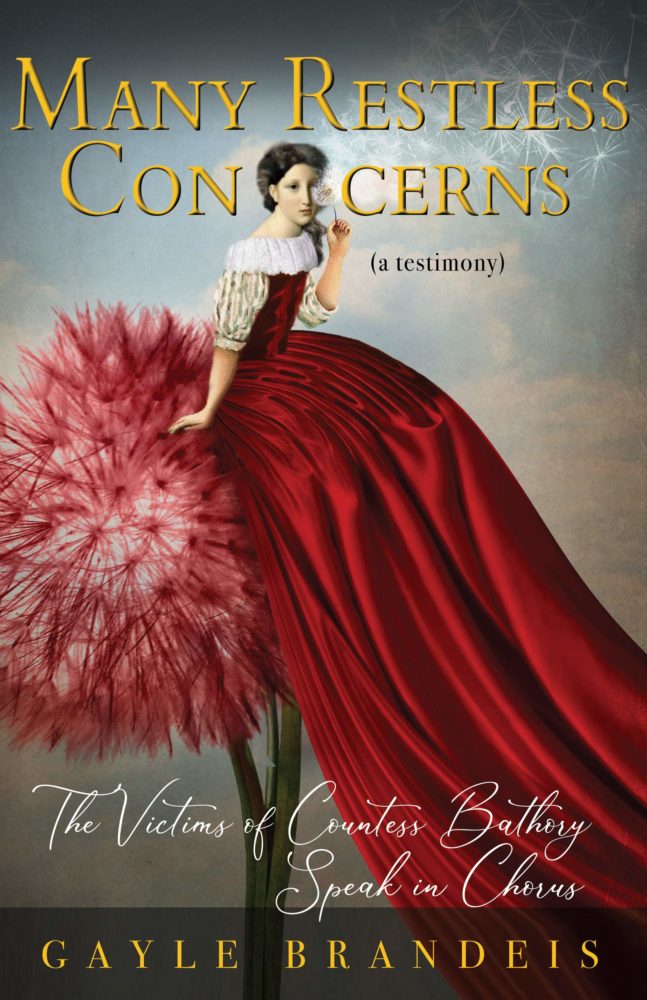A year ago, my family adopted a puppy—a sweet little Maltese/Yorkie mix named Pepper—from a rescue organization. Along with all the delight she’s brought to our lives, Pepper has become both mirror and muse to me as a writer. Her way of being in the world resonates in many ways with my creative process, especially in the writing of my new book, Many Restless Concerns: The Victims of Countess Bathory Speak in Chorus (A Testimony).
I appreciate Pepper guiding me to write like a dog.
Dive in
Pepper entered our lives in the midst of a brutal winter, a stretch of time when we often woke to several new inches of snow. The humans of our household were sometimes intimidated by the powder that came up to our shins, but Pepper would dive into it full-force, roll in it, revel in it.
I found it thrilling to watch her explore the elements with such enthusiasm. It reminded me how I’m happiest when I throw myself into all my endeavors—including my writing—with the same full-bodied curiosity. She inspired me to ask myself where I might be holding back in my writing, where I might give myself more fully to my work.
Follow your instinct
 It’s winter again now, and I still love to watch Pepper roll and sniff around, taking in all the intriguing smells on and under the snow. Every once in a while, a scent captures her attention and she starts to dig through the drifts until she finds the item calling her—today, she was particularly excited to discover a winged maple seed. As a writer, I try to keep my senses open, too, to sniff out potential sources of inspiration, to trust when something in me tells me to dig deeper. That’s how I found my way into my new book several years ago.
It’s winter again now, and I still love to watch Pepper roll and sniff around, taking in all the intriguing smells on and under the snow. Every once in a while, a scent captures her attention and she starts to dig through the drifts until she finds the item calling her—today, she was particularly excited to discover a winged maple seed. As a writer, I try to keep my senses open, too, to sniff out potential sources of inspiration, to trust when something in me tells me to dig deeper. That’s how I found my way into my new book several years ago.
At the time, my teenage daughter was intrigued by notorious women in history. One day, I was flipping through one of the books she had asked me to purchase and everything in me woke up when I reached a page about Countess Bathory of Hungary who reportedly killed up to 650 girls and women around the turn of the 17th century. I hadn’t been consciously looking for a new book project, certainly not something so historic or grisly, but something about this story piqued my curiosity, like an intriguing scent beneath the snow.
Scare yourself
I started to dig, to learn more about the time period, the Countess, to envision all the girls and women she had silenced. And this was scary, because of both the subject matter, full of torture and murder, as well as the form the book eventually told me it wanted to take—a novel in poems, something I hadn’t attempted before. As I moved forward with the project, there were times I wasn’t sure I recognized myself as a writer.
Similarly, like a lot of animals, Pepper doesn’t always recognize her own reflection and this sometimes freaks her out; she’ll bark and bark when she sees herself in a mirror or window or the glass door of the oven. My young son said “Pepper’s trying to protect us from herself. That’s deep.”
It’s deep indeed.
It’s often said that art serves to defamiliarize the known, to make the unknown familiar. As writers, it can be fruitful to scare ourselves, to go far out of our creative comfort zones, so far past the familiar stories we tell ourselves about ourselves, we momentarily have trouble recognizing our own reflection. The trick lies in not trying to protect ourselves or others from ourselves, not trying to bark the reflection away. As terrifying as it was at times, I’m grateful my new book offered me the opportunity to become a stranger to myself, grateful it helped me rewrite and expand how I see myself and what I’m capable of as a writer.
Stop judging
Shortly after we adopted Pepper, we took her to a puppy training class for socialization and some basic training and the instructor said an illuminating thing—dogs don’t have a sense of right and wrong, she told us, but they can learn what works and what doesn’t. This feels so applicable to our writing—it can be so easy for us to be harsh in our judgment of our own work, to deem what we’re doing “wrong” (and then, sometimes, heartbreakingly, to deem ourselves “wrong” as a result). It can help to shift our perspective on this and think more like a dog, to let go of the idea of “right” and “wrong” when it comes to our own writing and publishing journey.
It can help to think, instead, of our writing and submitting processes as either working or not working. It’s a subtle but powerful shift of word choice. We can always do something to make a piece that’s not working work—we can shift the verb tense or the POV, maybe trim out the excess, or fill in the holes, maybe start from a different place, or move toward a different ending. It’s much easier to find ways to make something work that doesn’t than to take something you think is fundamentally “wrong” and make it “right.”
Be dogged
Many Restless Concerns went through many restless drafts before it found the hybrid form that worked, at least for me; whether it works for readers remains to be seen. But even if it doesn’t work for readers, Pepper has also shown me the power of resilience, the ability to quickly let go of disappointment and find simple joy in the world around us. We can always write like a dog, finding fresh, delicious inspiration beneath the snow.
Looking for more great blogs on writing? We’ve got you.

